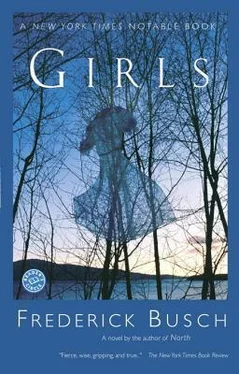Mrs. Tanner was wearing boot socks and pajama bottoms and a sweater under the blanket that was wrapped around her shoulders. It was a bright gold blanket, and I knew it would feel soft and almost damp, the way those machine-made fabrics felt. She seemed a lot stronger than yesterday, weaker than days before. Her almost-orange skin, with something darker underneath its soft top layer, looked tight.
And like someone trying to make sure she would haunt me later on, months later and years later on, she looked at me with her tired eyes with their brown-gray semicircles underneath and she said, “You look terrible, Jack. What hurts so much? What did you do to your fingers?”
“The fingers are fine,” I said, sitting across the table from her. The room was very hot, but I kept my coat on. I guess I was trying to join her in some of it. “There was what you would call a fracas. Law enforcement waded in and busted up their fingers.”
She shaped a little bit of what might have gone on to be a smile but didn’t.
“I hope you didn’t hurt any of the students.”
I shook my head. “I take care of them,” I said.
“Yes, of course you do. You must, apparently.”
“Must?”
“I’m being a soothsayer. It used to be my role. He would comfort them, and I would be an oracle of certainties. You need that kind of teamwork in the country-pastor profession. I hope you feel all right.”
“I hope you do.”
She put her wide hand, which was so light, out on the table. If there had been a newspaper, I thought, I could have read it through the back of her hand. The fingers were relaxed, almost curled. I took hold of it. I let my hand lie under hers. It weighed so little, my broken fingers felt almost nothing. I would have held her up if I could. I would have breathed for her.
Find her daughter, I told myself. That’s what she wants.
When I let my breath out, it sounded shaky even to me.
Her husband sat down. He put tea in shallow cups on saucers in front of each of us. He held the edge of the table.
He said with a hardness, “What.” It wasn’t really a question.
Mrs. Tanner said, “He knows something. Jack? You know something.”
I got the next breath in, and then I got it out.
“Maybe,” I said. “Possibly. I don’t know. Possibly. Can I ask you something?”
Nobody talked.
“Did she wear fancy underwear? Grown-up perfume? Did she read about love affairs in the supermarket newspapers? Did she watch about them on TV? Did her girlfriends talk about it? Sex? Love affairs? Sexy men — you know, movie stars, anchormen, sports people.”
“Oh,” the reverend said. He sat back. He lifted his teacup by the tiny handle and then he put it down. “Well, Jack! In my experience, all girls of that age—”
“Nobody ever talked about her acting like all girls before.” I added “Sir,” figuring it would make me seem more respectful and the questions less disrespectful. “You see what I mean? I never heard she was an average girl before.”
“Was,” Mrs. Tanner repeated.
“Damn,” I said. “Excuse me.”
“Damn,” she said. I don’t think she meant to be funny or comforting.
“She’s the perfect all-around kid,” I said. “She plays the coronet, she serves the underprivileged, she teaches Sunday school, and she’s a friend to all her neighbors. That’s unusual. Well, nobody added anything about her being a normal fourteen-year-old girl.”
“No,” her mother said.
“I don’t think of her as normal,” her father said. “She’s better than normal.”
“Normal isn’t bad,” her mother said.
“No,” he answered. “Not at all.”
“No,” she said.
“It’s just she’s a little … well, better, I guess you’d have to say. I’d have to say, anyway.”
That routine performed, they sat and waited for me to talk. I thought of the dog in the car, the ride home, the dark house. I suppose I sighed. I leaned away from the feeling in my right side. I thought of what might be opening up in there.
“I’ll be by tomorrow,” I said. “Maybe I’m getting at something. I haven’t got there yet. But I’m working. I’ll come by tomorrow.” I tried to be smiling when I said to her, “You plan on being home?”
“Above ground,” she said.
Her husband said, “My God.”
She said, “And there isn’t anything to tell us tonight? There is, Jack. I feel it. I’m sure of it. Why? I mean — you know very well what I mean. Please tell us now?”
“Let me get there,” I said. “I have to get there. ”
Her hand had stayed with mine. I’d felt it start beating, moving inside, when she thought I was going to tell her. I’d felt it slow after she knew I wouldn’t. Now she moved it so I’d let her go.
“You be here,” she said.
“You be here, too,” I told her. I was trying to think of a way to apologize for being so bad at all of this. It seemed to me I could start here, with Janice’s mother, and go on all night with anyone who cared to show up.
I backed us slowly out of their drive, and I went to Strodemaster’s. His house was lighted up. He was in his kitchen, moving slowly but regularly. When I opened his storm door and stuck my head in, I heard a loud hissing and I smelled onions and peppers. The cooking odors covered the stink of rottenness I’d expected. Over the sizzling of what was cooking in a smoky wide black skillet, I heard music. In his loosely tied flapping blue bathrobe with its pattern of toothpaste stains and food smears, he was moving in place at the stove. He seemed to be slicing a long sausage to the rhythm of the music. When I closed the door, I slammed it.
He jumped. He dropped a bright broad knife. When he saw me, he did a big motion with his shoulders to show me his relief. He held up a finger, then went to the radio on top of his refrigerator.
“Gene Harris,” he said, over noises of frying, which he didn’t turn down. “You know his stuff?”
“I don’t know much music,” I said.
“Piano,” he said. “Beautiful jazz piano. And he’s from Idaho. Who’d expect it? You know? From someone in Idaho?”
I didn’t care. I said, “Randy, can I talk to you?”
“Town-to-gown? Town-to-town? Or beer-to-beer?” His big eye-glasses were smeared. I saw he was wearing corduroy pants under the bathrobe, and a white T-shirt. Nothing looked like his food had missed it. The chalkboard had all kinds of fine wobbly lines on it. I thought it was a very complicated map. There were darker spots on it that looked slammed into place with the chalk. He finally turned the light off under the onions and peppers. He got us very expensive San Francisco beer from the refrigerator. He expected us townies to drink it from the bottle, so I sipped. I hadn’t tasted it before. It was wonderful, almost sour but not quite, and it got into my thirst. It was the first time any appetite of mine for anything except a short, thin woman felt satisfied.
He was watching me. “ Pas mal , huh?”
“Excuse me?”
“French. Gown stuff. Forgive me. I meant, not too bad.”
“I don’t speak French,” I said.
“No problem,” he said. He leaned back in his chair and he pulled another bottle out of the fridge. He had an opener at the table. “These things don’t have the little cutesy screw-off tops. You want a beer, you can open the mothers the old-fashioned way.”
“It tastes wonderful,” I said. I unzipped my coat, and when it swung behind me, it clanked.
“You sound loaded for bear,” he said.
“That’s me,” I said.
“So how’re you feeling, Jack? You got kicked to shit, halfway. You feel a little better?”
“I feel a little better,” I said. “Except I just came here from the Tanners’. Man.”
Читать дальше










